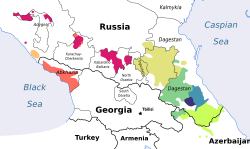Abžui
Abžui is a dialect of Abkhaz language, a North West Caucasian language.
Abkhaz, Circassian and Ubykh form the North West Caucasian language-group. Each language allows only one finite verb to appear in each sentence. In other words, these languages do not possess subordinate clauses, for it is part of the definition of a clause that it should contain a tinite verb.
Where, in a language of the familiar Indo-European model we should expect an adjectival or adverbial limiting clause, a participial form of the verb will be employed in the languages of the N-W Caucasus.
The tirst distinction to be made is that between verbs which describe a state; (stative verbs) and those which do not” (no I-stative verbs). The indicative paradigm for stative verbs is extremely simple, there being only 3 tenses - present and past, for example:
s-galo-up ‘I am standing’+ <-*s gala -up’
It is clear that the present tense is formed the addition to the root of the formant -up’, whilst the past tense is produced by substituting for this the simple -n.
The non-stative paradigm is more complex, there being ten tenses in the indicative (the examples quoted below are from the verb ‘to go’ "acara" - the first person singular in each case):
- Pluperfect s-ca-x-an
- Present s-co

